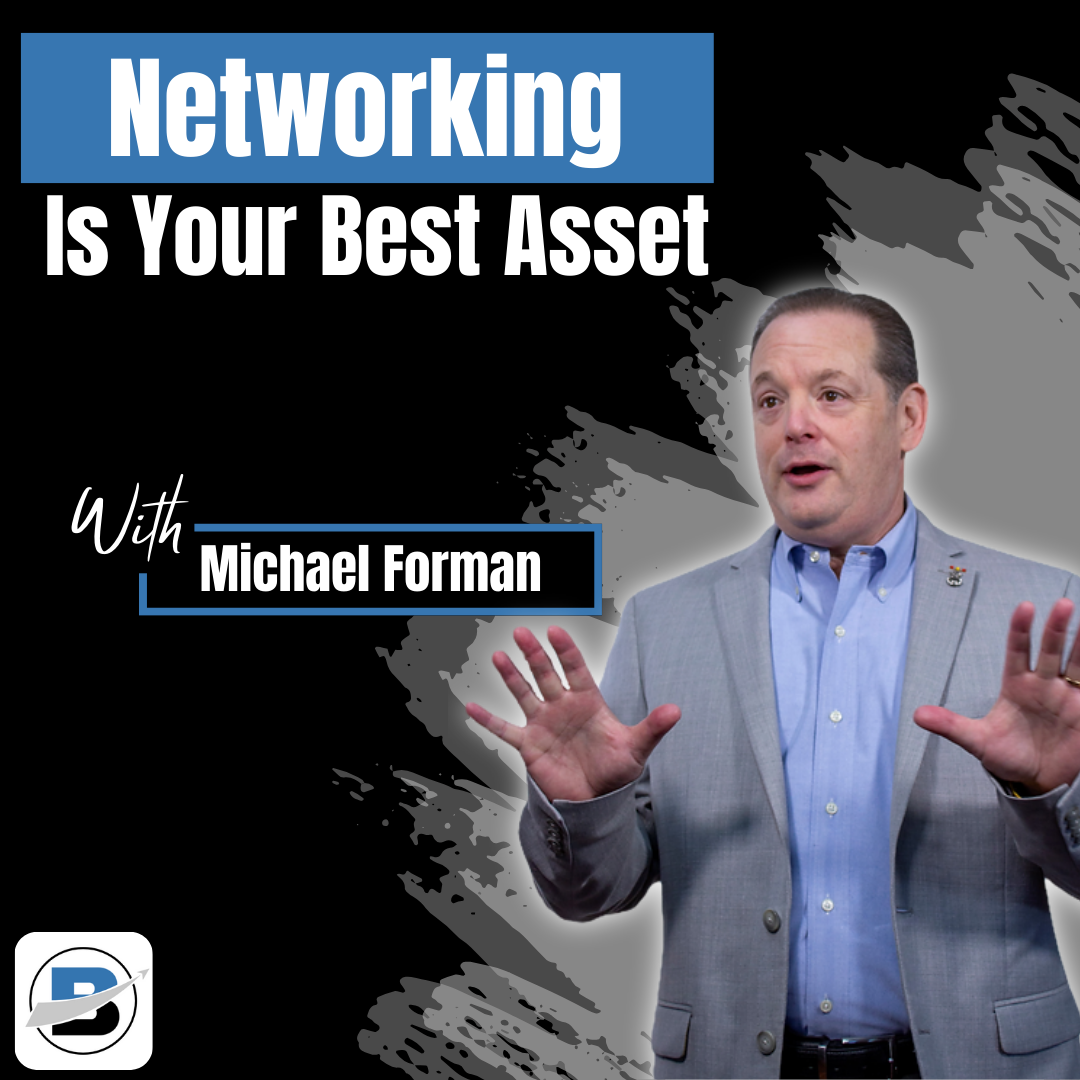Networking, CRM, and Scaling: Insights with Michael Forman
Introduction
As young entrepreneurs and small business owners, we’re constantly seeking ways to stand out, grow our networks, and build long-term success. But what if the secret to growing your business isn't just about cutting-edge strategies or high-tech solutions? What if it’s about something much more personal, human, and impactful? In this post, we’ll dive into powerful insights from Michael Forman — an expert in networking, CRM tools, and the art of growing your impact. Michael’s simple yet effective approach has helped countless entrepreneurs elevate their businesses and foster meaningful relationships. Let’s take a closer look at how his strategies can transform your business and help you build connections that last.
Starting Small with CRM Tools
What is a CRM and Why Does It Matter?
In today’s business world, staying organized is one of the keys to success. For young entrepreneurs managing growing businesses, this can be especially challenging. One tool that can make a huge difference is a CRM, or Customer Relationship Management system. But what exactly is a CRM, and why is it essential for small business owners?
A CRM is a tool that helps you keep track of interactions with customers, suppliers, and potential leads. It allows you to organize and manage contacts, track communication history, and follow up in a timely manner. In short, a CRM is your digital Rolodex — but it’s way more powerful and efficient.
Michael Forman emphasizes that starting small with a CRM can help you manage your business without getting overwhelmed. As your customer base and network grow, a CRM will help you stay on top of things, ensuring that no lead falls through the cracks and no important contact is forgotten. It’s especially helpful for managing communications with vendors, business partners, and potential clients. The ability to easily track interactions will save you time, reduce stress, and help you grow your business more effectively.
Choosing the Right CRM for Beginners
For those just starting out, there’s no need to invest in an expensive CRM system right away. Michael suggests using free, beginner-friendly tools like HubSpot to get started. HubSpot offers a free version of its CRM that is simple to use and ideal for small businesses with limited budgets. It allows you to track contacts, set reminders for follow-ups, and organize your communications.
While it’s tempting to use spreadsheets or even sticky notes to manage contacts, these methods can quickly become chaotic as your business grows. A CRM tool will help you stay organized, automate basic tasks, and allow you to scale your efforts without feeling overwhelmed. HubSpot is a great entry-level CRM, but there are many others to consider, including Zoho and Pipedrive, all of which offer free versions to help you get started.
How to Transition to a Paid CRM
Once your business starts growing and you find that the free version of your CRM is no longer enough to meet your needs, it’s time to think about upgrading. Michael explains that the key is recognizing when your business has outgrown its current system. For example, if you start managing hundreds of contacts, tracking follow-ups manually or on a spreadsheet becomes cumbersome.
Upgrading to a paid CRM will allow you to access more advanced features like detailed analytics, segmentation, and automation. But even as you make this transition, Michael advises not to rush. Start small, and only upgrade when it makes sense for your business needs. This way, you’ll avoid overpaying for features you don’t yet need. With the right CRM, you’ll be able to track and nurture your contacts with greater efficiency.
Avoiding Common CRM Mistakes
Mistake 1: Not Following Up
One of the biggest mistakes small business owners make when using a CRM is failing to follow up properly. Whether it’s a missed call, an unanswered email, or a forgotten meeting, neglecting follow-ups can cost you valuable leads and opportunities. Michael emphasizes the importance of timely follow-ups and staying top-of-mind for your contacts.
A CRM tool can help you automate reminders, but the real key to effective follow-ups is consistency. Create a system for regular check-ins with your prospects and customers, and make sure you always follow through. This shows your clients that you value their business and are committed to building long-term relationships. In the world of business, people often appreciate a simple reminder that you’re there to help.
Mistake 2: Poor Organization
Another common mistake small business owners make with CRMs is poor organization. If your CRM isn’t set up properly or your contacts are not labeled effectively, you’ll waste time searching for the information you need, or worse — miss important follow-ups altogether.
Michael stresses the importance of organizing your CRM early on. Proper labeling, segmentation, and tagging can make it easier to find exactly what you’re looking for, saving you time and effort. For example, label contacts by category (e.g., vendors, prospects, clients) and add personal notes where necessary. This way, you can filter and find exactly what you need when you need it.
The Role of Gratitude in Business
The Power of Handwritten Thank-You Notes
In the hustle and grind of entrepreneurship, it’s easy to forget the power of a simple "thank you." But Michael Forman insists that one of the most underrated strategies for building strong relationships in business is the handwritten thank-you note. Taking the time to write a personal note to someone — whether they’re a client, vendor, or business partner — creates an emotional connection and shows genuine appreciation.
Imagine how impactful it would be to receive a thank-you note in the mail, especially when all you usually get are bills. Michael carries thank-you notes with him everywhere he goes, ready to send them out after meetings or presentations. This small gesture can leave a lasting impression and set you apart from other business owners.
How Gratitude Sets You Apart
Gratitude is a powerful tool in business, and it goes beyond just saying "thank you." It’s about showing your clients, employees, and partners that you value their time and effort. Michael Forman explains that when you express gratitude, you build a sense of goodwill that transcends the transactional nature of business. People want to work with people who make them feel appreciated.
Incorporating gratitude into your daily routine doesn’t take much time, but it can have a huge impact. Whether it’s sending a thank-you note, recognizing an employee’s hard work, or publicly thanking a client for their support, these small acts of appreciation create a culture of respect and trust. As a result, you’ll find that your relationships with customers and partners deepen, leading to better retention, higher loyalty, and more business opportunities.
Lessons in Leadership
The Importance of Making Decisions
Another valuable lesson Michael shared is the importance of making decisions. In business, there’s no such thing as a "perfect" choice — but indecision can lead to missed opportunities and wasted time. Michael learned this lesson during his time as a police officer in the Air Force, where he was taught that making a decision, even if it’s wrong, is better than making no decision at all.
For entrepreneurs, this means embracing a mindset of action. You can’t wait for everything to be perfect or for all the information to be available. Sometimes, you just need to make a decision and move forward. Even if you make a mistake, you’ll learn from it and improve the next time around.
Keeping Employees Happy
Finally, Michael shares an important leadership lesson: It’s not always about pleasing the customer. Instead, focusing on your employees' happiness and satisfaction will lead to better customer service. Michael believes that happy employees are more productive and motivated, which directly benefits your customers.
Creating a positive work environment and ensuring your team is supported and valued should be a priority. When your employees feel appreciated, they’re more likely to go above and beyond to help your business succeed.
The Power of Giving Back
Why Community Engagement Matters
As a small business owner, it’s easy to get caught up in day-to-day tasks like managing operations, handling customer inquiries, and keeping the finances in check. However, one key element can make a huge difference in the growth and sustainability of your business: community engagement. Michael Forman believes that getting involved in your local community can open doors to unexpected opportunities. Whether through charitable work, local events, or nonprofits, community engagement allows you to meet people, gain visibility, and give back in a meaningful way.
Michael himself is passionate about causes like Tunnels to Towers, a nonprofit supporting veterans, and he’s always looking for ways to contribute. By showing up for your community, you build trust and show potential customers and business partners that you’re committed to something bigger than just profit. This not only enhances your brand’s reputation but can also organically grow your network and create potential collaborations.
Practical Ways to Get Involved
Getting involved doesn’t mean you need to dedicate huge amounts of time or resources. Michael recommends finding local organizations or events that align with your business values. Whether it’s volunteering for a charity event, sponsoring a local sports team, or donating your services to a cause you believe in, small actions can make a big impact. These activities don’t just feel good; they also give your business visibility in front of a community of like-minded individuals.
Additionally, it’s important to keep in mind that people do business with people they know, like, and trust. By consistently showing up for others, you begin to develop relationships that go beyond transactional exchanges. You’ll find that some of your most valuable connections come from these grassroots efforts, where trust is built over time through your genuine involvement.
Key Takeaways for Entrepreneurs
Practical Tips to Implement Today
To wrap up, here are some key takeaways for young entrepreneurs looking to level up their businesses:
Get involved in your community: Whether through charity work, local events, or partnerships, giving back can help build your network and boost your visibility.
Start using a CRM: Even if you're just starting out, a CRM can help you organize your contacts, stay on top of follow-ups, and grow your business efficiently.
Express gratitude: Whether through handwritten notes or other forms of recognition, expressing appreciation goes a long way in building strong, lasting relationships.
Make decisions and take action: Don't get stuck in analysis paralysis — take action and learn from your experiences.
By following these steps, you can build a solid foundation for your business that prioritizes meaningful relationships, organization, and gratitude — principles that Michael Forman believes will lead to long-term success.
If you’re ready to take your business to the next level, consider implementing Michael’s strategies today. Whether it’s community involvement, upgrading your CRM, or simply sending a thank-you note, the small steps you take today can lead to significant growth and success tomorrow.

